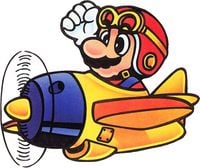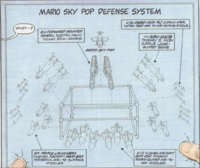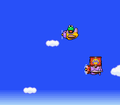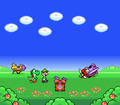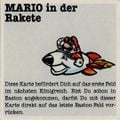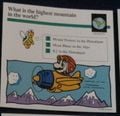Sky Pop
The Sky Pop[1] is a yellow airplane first and mainly appearing in Super Mario Land.
History[edit]
Super Mario series[edit]
Super Mario Land[edit]
The Sky Pop is used only in World 4-3 of the Chai Kingdom. It can fire missiles with unlimited ammunition. Mario uses it primarily to defeat Chickens, Biokinton, Roketons, and Tatanga. After defeating Tatanga, Mario flies off with Princess Daisy in a separate flying machine that is jet-powered and has two; this second jet has been referred to as the Sky Pop II.[citation needed]
Super Mario Land's board game adaptation, Das Super Mario Spiel, features a card depicting Mario riding a rocket, which is presumably an interpretation of the Sky Pop.
Super Mario Maker[edit]
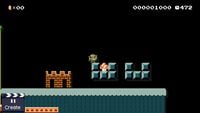
A Costume Mario costume based on the original sprite of Super Mario piloting the Sky Pop appears in Super Mario Maker. The costume was officially released on January 6, 2016, and can be unlocked by completing the "Southwest Air Adventure" Event Course. All of the costume's sound effects and fanfares (transformation, jumping, clearing a course, and losing a life) are taken from Super Mario Land. Pressing up on the ![]() causes Mario's legs to appear from under the plane and face the screen, playing the sound for collecting a coin from Super Mario Land.
causes Mario's legs to appear from under the plane and face the screen, playing the sound for collecting a coin from Super Mario Land.
Game Boy[edit]
The Sky Pop plays a major role in the issue "Team Play" of the Game Boy limited comic book series. After Greg Campbell informs Mario of Pionpi's Pacific island fortress, Mario takes off from the USS Nimitz. As he closes by the fortress, the Sky Pop is ambushed by flying enemies, and Mario notices the island's defenses are using real-world ammunition.
Heavily damaged, Mario takes the Sky Pop back to the carrier and makes a crash landing. The plane is caught in extremis by Greg, and Mario requests to be given access to the carrier's weapons. Greg is initially reluctant, but reasons that Tatanga's forces have invaded U.S. territory by taking over the island, and draws up with Mario the "Sky Pop Defense System", a frame around the plane able to outfit a pair of Vulcan cannons, Sidewinder, Phoenix and Maverick missiles, and GBU-10E/B Paveway II laser-guided bombs. The Sky Pop takes off again (confusing two command tower operators) and Mario assaults the island fortress forces, now easily destroying them with his new weapons. Mario lands on the island and confronts Pionpi, but he soon takes off in the Sky Pop again when he learns a friendly F/A-18 Hornet from the carrier's detachment has been heavily damaged and is on course to crash with the Nimitz. From the Sky Pop, Mario grabs the left wing and manages to right the plane up, ensuring a safe landing.
The Sky Pop reappears briefly in the series' final issue, Pipes is Pipes. When Michael Hallis summons Mario from the Game Boy, Mario immediately appears piloting the Sky Pop, and uses it to fly to Clam Creek's nuclear reactor. Later, Michael's mother picks up the plane offscreen and puts it in her personal locker. After retrieving Mario from an inspector at the facility, Mario wakes up and attempts to take off with the Sky Pop to rescue Michael, but he is too weakened by his radiation exposure to fly it. Michael's mother instead puts Mario in her bag and drives home.
Super Mario Bros. Print World[edit]
The Sky Pop is one of the designs in Super Mario Bros. Print World.
Mario & Wario[edit]
The Sky Pop in Mario & Wario is shown to have a conventional-type landing gear configuration, but uses a monopod instead of a tailwheel. It appears after clearing the tenth stage, Wario Tei, where the Sky Pop is used to intercept Wario and drop one of his enchanted Barrels on his head.
Super Mario (Kodansha manga)[edit]
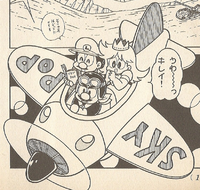
The Sky Pop appears at the end of Super Mario Land of the Super Mario manga published by KC Deluxe. It is said to have been used by Dousi in his youth, who had mastered it and tells Mario that he needs to make good use of his thumb and index finger. This is later revealed to be a suggestion on how to shoot more efficiently. The plane's console is designed as a Game Boy: by shooting missiles while holding down the button and repeatedly pressing the
button, the pilot is able to shoot faster.
In Super Mario Land 2, Luigi uses the Sky Pop to try to attack King Tetris' spaceship, but gets coiled by a prehensile cable. Later, Mario uses the Sky Pop II to attack the Tetton Daimajin and manages to land a few hits before King Tetris displays a picture of Princess Daisy showing off her leg on the outer screen of the robot to distract him and swats him with the robot's hands.
The plane reappears in the beginning of the Super Mario World 1 volume. Here, Mario, Luigi, and Princess Peach use it to land on an island for their vacation.
Mario Quiz Cards[edit]
The Sky Pop appears in artwork for one of the cards in the "Geography" category of the Mario Quiz Cards, specifically the card "What is the highest mountain in the world?".
Yoshi's Woolly World / Poochy & Yoshi's Woolly World[edit]
Yoshi has a transformation based on the Sky Pop in Yoshi's Woolly World and Poochy & Yoshi's Woolly World, known as Sky Pop Yoshi. It controls similarly to the Sky Pop's appearance in Super Mario Land.
Profiles[edit]
Super Mario Land[edit]
- Nintendo 3DS Virtual Console manual description:
- English (American):
Mario flies through the air in this missile-armed airplane. - English (British):
This plane soars through the air. It is Mario's trademark aeroplane. - Other languages:
- Dutch:
In dit vliegtuig suist Mario als een vogel door de lucht. - French (Europe):
L'avion fétiche de Mario, qui lui permet de se déplacer dans les airs. - German:
Mit diesem Flugzeug, das sein ganzer Stolz ist, schwingt sich Mario in die Lüfte. - Italian:
Questo aeroplano ti permette di volare nel cielo e Mario ne va molto fiero. - Spanish (Europe):
Mario se siente muy orgulloso surcando los cielos en su fantástica aeronave.
- Dutch:
- English (American):
Gallery[edit]
Shogakukan guidebook for Super Mario Land 2: 6 Golden Coins
Sky Pop with Yoshi in Mario & Wario
Kellogg's trading card
French Club Nintendo magazine poster
Super Mario Maker costume
Names in other languages[edit]
| Language | Name | Meaning | Notes |
|---|---|---|---|
| Japanese | スカイポップ号[2] Sukaipoppu-gō |
Sky Pop machine | |
| Dutch | Sky Pop[3] | - | |
| Sky Pop (vliegtuig)[4] | Sky Pop (airplane) | ||
| French | Sky Pop[?] | - | |
| Sky Pop (l'avion)[5] | Sky Pop (the plane) | ||
| French (NOE) | Sky Pop (avion)[6] | Sky Pop (plane) | |
| German | Sky Pop (Flugzeug)[7] | Sky Pop (Airplane) | |
| Sky Pop[8] | - | ||
| Italian | Sky Pop[?] | - | |
| Sky Pop (Aeroplano)[9] | Sky Pop (Airplane) | ||
| Russian | Неболет[?] Nyebolyot |
Skyflier | |
| Spanish | Sky Pop[?] | - | |
| Pop Celestial[10] | Celestial Pop |
References[edit]
- ^ 1989. Super Mario Land instruction booklet. Nintendo of America (American English). Page 13.
- ^ 1989. スーパーマリオランド (Sūpā Mario Rando) instruction booklet. Nintendo. Page 12.
- ^ Club Nintendo (Netherlands) Classic. Page 6.
- ^ Super Mario Land Nintendo 3DS Virtual Console electronic manual (Dutch). Tab 14: "Personages".
- ^ Super Mario Land French instruction booklet. Page 13.
- ^ Super Mario Land Nintendo 3DS Virtual Console electronic manual (European French). Tab 14: «Personnages».
- ^ Nintendo of Europe (1990). Super Mario Land Spielanleitung. Großostheim: Nintendo of Europe (German). Page 13.
- ^ Super Mario Land Nintendo 3DS Virtual Console electronic manual (German). Tab 14: „Figuren“.
- ^ Super Mario Land Nintendo 3DS Virtual Console electronic manual (Italian). Tab 14: «Personaggi».
- ^ Club Nintendo (Mexico) Año 1 No. 1. Page 32.
| Super Mario Land | |
|---|---|
| Protagonists | Mario • Princess Daisy |
| Bosses | King Totomesu • Dragonzamasu (Tamao) • Hiyoihoi • Biokinton (Chicken) • Tatanga (Pagosu) |
| Locations | Sarasaland (Birabuto Kingdom • Muda Kingdom • Easton Kingdom • Chai Kingdom) |
| Levels | World 1-1 • World 1-2 • World 1-3 • World 2-1 • World 2-2 • World 2-3 • World 3-1 • World 3-2 • World 3-3 • World 4-1 • World 4-2 • World 4-3 • Expert Level |
| Items & vehicles | Super Mushroom • Superball Flower • Star • 1UP heart • Coin • Marine Pop • Sky Pop • Switch • Lift Block |
| Enemies & obstacles | Batadon • Bombshell Koopa • Bullet Biff • Bunbun • Chikako • Dropping lift • Falling block • Falling spike • Fly • Ganchan • Gao • Gunion • Goombo • Honen • Kumo • Mekabon • Nyololin • Pionpi • Pipe Fist • Piranha Plant • Pompon Flower • Roketon • Roto Disc • Suu • Tokotoko • Torion • Yurarin • Yurarin Boo |
| Other | Brick • Bonus game • Das Super Mario Spiel • Gallery • Glitches • Goal • Main Theme • Media • Mystery Block • Sub-area • Soundtrack |
